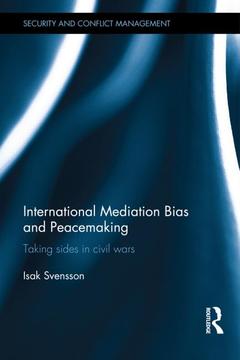International Mediation Bias and Peacemaking Taking Sides in Civil Wars Routledge Studies in Security and Conflict Management Series
Auteur : Svensson Isak

This book examines the effect of biased and neutral mediators in civil wars.
Based on analysis of both global data and case studies of contemporary peace processes, including India and Norway in Sri Lanka, China in Cambodia, US in Israel/Palestine, and Russia in Georgia, the book makes two main contributions. First, it explores the role of biased mediators in contemporary peace processes. The author develops a theory explaining why biased mediators are more effective than their neutral counterparts and the book identifies four different mechanisms through which biased mediators can be effective peace-brokers. By developing a comprehensive set of mechanisms to explain bias mediation, the work deepens understanding of biased mediators in general, and their role in resolving civil conflict in particular.
The second contribution offered is a novel way of measuring mediation success. Previous research has concentrated on settlement, behavior, or implementation. While these conceptualisations of mediation success all have merit, they fail to address how the basic incompatible positions are regulated. This book focuses on mediators? ability to regulate core compatibilities by crafting institutional peace arrangements that generally are considered to enhance the prospect for durable peace. This approach has wider implications for peace and conflict research by bringing together research on durability of peace and studies on international mediation, two fields of research which hitherto have been kept apart.
This book will be of much interest to students of international mediation, conflict management, civil wars, security studies and IR in general.
Preface Introduction PART I: Theory 1. What is Mediation Success? 2. Problems with Unbiased Mediators 3. Why Biased Mediators bring Peace Institutions PART II: Empirics 4. The Effects of Mediators on Peace Institutions: Statistical Analyses 5. Getting the Government to Make Concessions: India and Norway in Sri Lanka 6. Facilitator and Guarantor: Malaysia in the Philippines 7. Doing (Almost) the Most of a Special Relationship: US Mediation in Camp David II 8. From Warmongers to Peacemakers: Biased Mediators in Cambodia 9. Security Guarantees as "Peacekeeping": Russia in Abkhazia PART III: Conclusions 10. A New Role for Unbiased Mediators? 11. Prospects and Problems of Biased Mediation
Isak Svensson is Associate Professor at the Department of Peace and Conflict Research, Uppsala University, Sweden, and former Director of Research at the National Centre for Peace and Conflict Studies, University of Otago, New Zealand. He is the author of The Go-Between: Ambassador Jan Eliasson and the Styles of International Mediation (co-authored with Peter Wallensteen, 2010), and Ending Holy Wars: Religion and Conflict Resolution in Civil Wars (2012).
Date de parution : 12-2014
15.6x23.4 cm
Date de parution : 07-2016
15.6x23.4 cm
Thèmes d’International Mediation Bias and Peacemaking :
Mots-clés :
mediation; civil wars; peace processes; Sri Lanka; Cambodia; Georgia; Palestine; Biased Mediators; Unbiased Mediators; Amer Ican; Georgian Soviet Socialist Republic; Vice Versa; Mikhail Gorbachev; Peace Institutional Arrangements; CIS Peacekeeping Force; Camp David II; Territorial Power Sharing; Peace Institutions; Military Power Sharing; Zartman 1995b; Khmer Factions; Camp David Ii Negotiation; MILF; Political Power Sharing; Intrastate Armed Conflicts; Abkhazian Separatists; Phnom Penh; Cambodian Case; Clinton Proposals; Israeli Side; External Backers; Taba Negotiations



